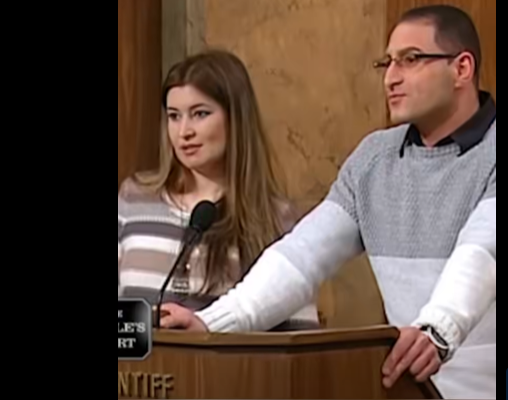In a recent courtroom case, a bitter dispute over a $3,000 loan played out between a former couple, with the plaintiff, Rammy Shaloo, suing his ex-girlfriend, Karina Bravo, for the amount he lent her to retrieve her impounded car. The case, heard by Judge Marilyn Milian, saw both sides bringing forward compelling arguments and claims of betrayal, mismanagement, and deceit.
The relationship between Rammy Shaloo and Karina Bravo began as a romantic partnership that lasted for over three years. However, their relationship ended abruptly due to Karina’s behavior, which included staying out late and allegedly lying about her whereabouts.
Rammy claimed that these actions contributed to the breakup, leaving him frustrated and heartbroken.
Despite the breakup, the former couple remained in contact. About a year later, after Rammy had moved on and married someone else, he received a request from Karina for financial assistance. She needed $3,000 to pay off the fines and retrieve a car that had been seized by authorities.
In an attempt to help his ex, Rammy loaned her the requested amount, but he did so under false pretenses. He told his pregnant wife that the money was for his ailing mother, rather than admitting that he was sending the money to Karina.
This act of deceit would later become a point of contention in the courtroom.
Rammy did not just transfer the money to Karina. In an effort to assist her, he went beyond what one might expect from a simple loan. Not only did he provide the funds, but he also went to the Department of Motor Vehicles (DMV) to retrieve the necessary documents for the car, further aiding his former girlfriend.
However, despite his good intentions, Rammy’s actions seemed to have negative consequences in his personal life. His wife was unaware of his financial dealings with Karina, and when she found out, it caused tension in their marriage. Rammy admitted that his actions were driven by a sense of guilt and perhaps lingering affection for his ex-girlfriend.
When the lawsuit was filed, Karina acknowledged receiving the $3,000 loan from Rammy. However, she had a different perspective on the financial arrangement. She claimed that a significant portion of the $3,000—specifically $1,250—was owed to her by Rammy due to damages he caused to her belongings when they broke up.
According to Karina, Rammy had destroyed her TV and desk during their breakup, and the court had ruled that he should pay her for the damage.
In addition to the damage claim, Karina admitted to repaying Rammy $1,000 of the loan, but she argued that the remaining amount should be reduced to account for the damages. She also revealed that she had filed a restraining order against Rammy, citing harassment as the reason behind the legal action.
Judge Marilyn Milian reviewed the claims and evidence presented by both parties. The court was tasked with determining how much, if any, of the $3,000 loan Rammy was owed. The judge took into account Karina’s assertion that $1,250 of the loan should be forgiven due to the damage Rammy had caused.
Since Rammy did not provide evidence that he had already repaid this amount, Judge Milian accepted Karina’s claim and subtracted this amount from the total loan.
Next, Karina acknowledged that she had repaid $1,000 of the loan. This payment was also deducted from the total amount owed.
The ruling brings closure to the financial aspect of the dispute, but the emotional fallout from Rammy’s choices may continue to affect both parties. Whether or not Rammy’s marriage can recover from this breach of trust remains to be seen, but Judge Milian’s verdict serves as a cautionary tale about the importance of honesty and transparency in relationships.
This case stands as a reminder of the potential consequences of unresolved emotional ties and the difficulty of moving on from past relationships. For Rammy and Karina, the road to reconciliation—whether in personal relationships or financial matters—remains uncertain.


